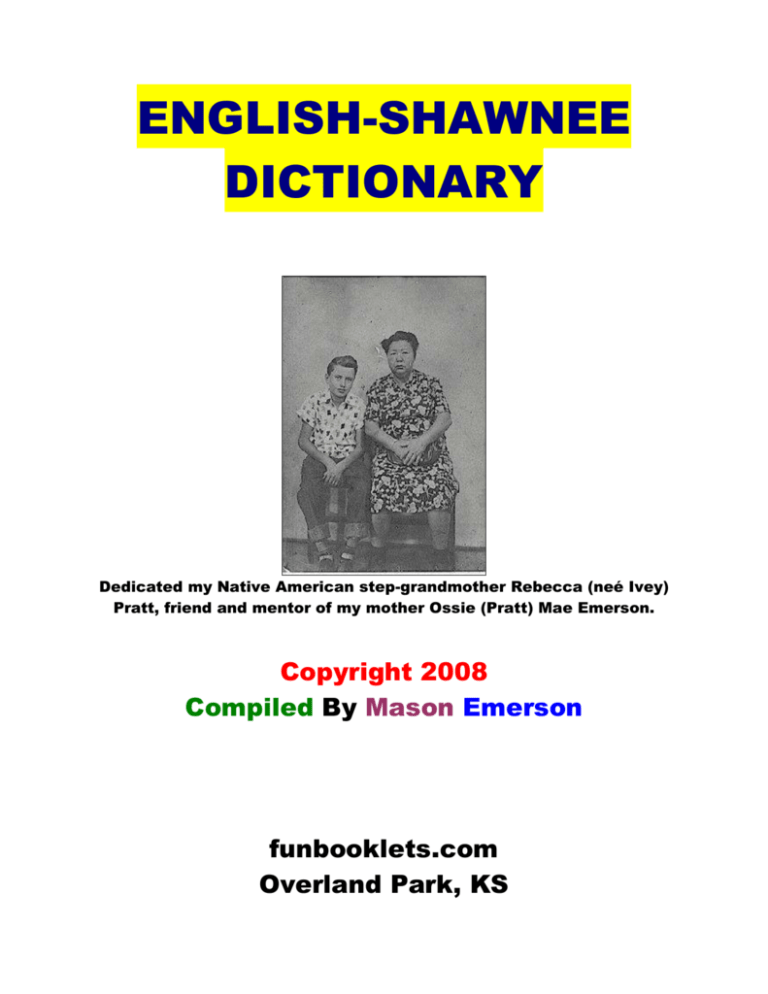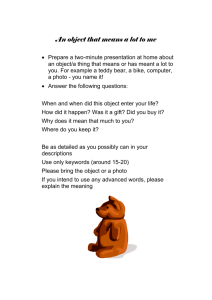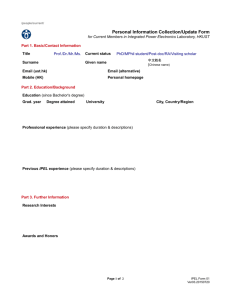to file - funbooklets.com
advertisement

ENGLISH-SHAWNEE DICTIONARY Dedicated my Native American step-grandmother Rebecca (neé Ivey) Pratt, friend and mentor of my mother Ossie (Pratt) Mae Emerson. Copyright 2008 Compiled By Mason Emerson funbooklets.com Overland Park, KS DEDICATION This is dedicated to my mother’s Native American step-grandmother (born Rebecca Ivy, seen in the photo above with one of her sons) who, after my grandmother died at childbirth, raised my mother and imparted a great appreciation and love for Native American culture. FOREWORD The vocabulary compiled here thus far comes mostly from Butler’s word list which he complied at the request of then U.S. President George Washington for the queen of Russia. Butler did not fully alphabetize it but in general his work has word entries usefully grouped by related meanings although within those groupings they tend to be only somewhat alphabetized. Therefore I have sought to thoroughly alphabetize them. Next to Butler’s dictionary, the second most used source was that of Gatchet, his words presented here in bold lettering. Butler was more systematic but Gatchet seems to have had more of an ear for sound distinctions. It is quite likely that differences over the vocabulary for particular words is the result of the two having had different speakers and even speakers of different dialects of Shawnee, there being four different groups before the American Revolution. I feel much in debt to the afore-mentioned as well as some modern individuals and wikipedia.org (see farther below) insofar as not only some of the vocabulary entries but also information helping to make it possible to determine the most probable pronunciation of letters as used for and in the respective spelling systems of Butler and Gatchet. Special thanks are also accorded the library at Haskell Indian College. Today only about 200 of about 14,000 Shawnee are known to speak Shawnee, but by means of this compilation it is hoped that the Shawnee language and culture will not only survive but also be better transmitted to succeeding generations. Possibly young people, whether Shawnee or those like myself who are interested although not Shawnee, will learn at least some of the language and pass along their enjoyment for it to others. For those who are curious about the author’s background, I am not Shawnee, but according to family tradition our branch of the Emersons do include some Native American ancestry, said by my father to be Chickasaw possibly coming from our relatives the Utterbacks. Also, my mother’s stepmother (see preceding photo) was Native American, possibly Shawnee or Cherokee, and through my mother passed on an appreciation for Native American culture. For many years I taught English as a Second Language, German, Spanish, regular English. I hold the M.A. in English, have a concentration in linguistics, have had an interest in languages since childhood. Since all modern humans are related, our world is much more enriched with a wide variety of cultures including the different languages. May the star of the Shawnee language shine on brightly! Happiness to all. Mason Emerson, Compiler GRAMMAR SKETCH Adjectives go before nouns as in English. Sentence word order is generally subject-verb-object or verb with pronoun affixation followed by object. There are various possible ways to form plurals, but adding the ending –kie is one which is quite common. The verb “to be” is not used though understood as when “Blood red” has the same meaning as “Blood is red.” PRONUNCIATION NOTES Vowels: a=ma, e=let, i=pit, o=lot (short oh sound or –aw as in law), u=cut; ea=may be ee as in meat followed by the short e in pet; ee=the sound of e in let but longer in duration, ie=chief; oo=moon; Consonants: g=go. It is notable that Butler often uses –kie for a plural ending equivalent to English –s, but Gatchet uses –gi. This may indicate that the actual sound is between a –k- and a hard –g- (e.g. go), for example as appears in the –k- in the English word sky which to many everyday English speakers sounds more like hard g than k. ch=chin, psh as used by Satchet may be his way of indicating a sharp or elongated s (hiss) or sh (she) sound without the p being sounded, qu=kw as in quack, sh=she, th=thin ENGLISH-SHAWNEE DICTIONARY above again already and angry animal ant apple arrow spimmikie (spihm-mih-kee) huwe noki (used between nouns), wētchí; and also: tchínä; huwe: and now then wiockowe miekenwhe, maginhwe; animals: maginhwegi sagaluethi; ants: sagaluethigi mshimina; apple tree: mshiminakua wipi, Native American arrow: hilena lui (lui=a misile); arrows: wipali; Native American arrows: hilenalu, lenalloo kis’hagi, arrowheads -- public domain photo courtesy of wikipedia.org Technically, arrowheads may be used for arrows or other purposes such as scraping. arrowhead kis’ha (kees-hah) bad bag basket bat (winged creature) bathroom be bead bean bear motchie, motchathie peetaka soosunie (soo-suh-nee) peesacatha, pithagatha, pissagatha; bats: pithagathagi Not used but understood to be some area such as behind a tree. relieve oneself as in a bathroom: mee-thie; I relieve myself: nie meethie The verb “to be” is not used though understood as when “Blood red” has the same meaning as “Blood is red.” bead petsua; beads: petsuaki mskudshi mochqua, mkwa; bears: mochquoc-kie; he bear: napechqua; I urinate: nie seekie she bear: nos-sech-qua; bear cub: pos-sech-qua amechqua, beaver -- public domain photo courtesy of wikipedia.org beaver because bee big bird below black amechqua (ah-mehch-kwah); beavers: amechquakie ksakie hemu, hemukie missawie, misoi wieskillotho lameki muchcuttewithie miniagi: blackberries – public domain photo courtesy of wikipedia.org blackberry blood blue book/paper bottle bow box mina: blackberries: minagi; Butler offers “cuttewa meenockie” for singular and plural, but it may be not the word the specific berry but simply a “black-colored berry.” misquie skippuckie, wipekwi (h)ewigategi; books/papers: (he)ewigatewali withacochqua hilenaquie, elenaquey; bows: lenako tagákwiga bread brother tockquana, takwa; breads: takwana older b.: thetha, younger b.: theemetha methotho, beaver -- public domain photo courtesy of wikipedia.org buffalo but can (able) cannot canoe cat (house cat) cave certainly child cloth cloud cold come corn cut daughter day dead death (teppelloo) methotho; buffaloes, cattle: methothokie paye'kwa sometimes not expressed but guessed at from context, for example “I go” understood to mean either “I go” or “I can go.” halwi; I can’t: talwi lookesie poosheetha kuta walakwi, caves: kutawalako weka niechan; baby, young child: oppellootha, hapelotha mottitawallie, cochcotteppithoe cloudy: pothquotte weapie I come: nila nepia, nila nipia; you come: kila kipia; s/he comes: wila piewa, it comes: wiehi pieya; we come: kilawe kipiape, you (all) come: kilawa kipiapwa they come: wilawa piegi (more verb forms are at Satchet page 384) tamie kiskha, kiscutta, kisentte ta-ne-tha; my daughter: nie tanetha, your daughter: keetanetha, his/her daughter: ootanetha keeshqua, keesqua, kíseki, kisheki neppwoa neppoa pissickthie, deer -- public domain photo courtesy of wikipedia.org deer pissickthie; deer (plural): pissicktheekie, psekthigi dog don’t! door down drink duck wiehsie tic-kee squate (this word can also mean gate) under: sochkiekie min-ne sisseepa, siesiepa, zhizhiba eagle, pelethi -- public domain photo courtesy of wikipedia.org eagle ear earth earthquake eat egg eight eleven pelethi (peh-leh-thee, soft th as in thin) ochtowaka, towaka; ears: towakawalie land: assiskie; country: ake, aki; ground/dirt/soil: hassiskí nenekéska hashíshki weethennie, miichi owawi; eggs: owawali thwasicthwie niquottielethie elk, wapiti -- public domain photo courtesy of wikipedia.org elk eyes far, far away fast father field fight fire fish five flower food foot forest, woods formerly, in the past four wapiti kiskeessiqua pellawie, pelui quickly: quickly kwakwí; rapid: kisshichtannie my father: nootha kitticka (kihttihkkah) nutch-hittie (nuhch-hih-tee) scutte nametha; fish in the plural: namethakie niollonwie papeki, papekiwena flour, meal: luk’hána flour, meal kussie metequeghke, peeleskie yechkie; long ago: sechcommika niewawie fox friend wacuchethie ka-anah; my friend: nekaanah tutu, frog -- public domain photo courtesy of wikipedia.org frog from fruit give glad go God gold good goodbye goose grape grass great green gun hand handsome hatchet he head health hear heart heaven hello here high hill hog hole horse hot tutu (too-too, large frog or bullfrog): large frogs or bullfrogs: tutugi; little frog/toad: tututha; little frogs/toads: tututhagi from it: wewithhoe; removing from place to place: hachie, hachikie missimmennokie, mawithowe meela; give me: meelee wossaleppoa hale; I am going: níla nháya; go along: hatakoo; go on foot: kittouthe go, leave, depart: wehpetheh wosso monnito coolie, uthawa moonie wossa; very good/better: olami wossa, unusually good alallica wossa Good day. Weesegisegi cochkockie, cochcookie (wine) grape: pthalomi green grass: shkibakshkatui; dry grass: kayakitegi mskutekualo missie, missawie missiskippuckie pinha, pinhalwatie letchie willithie tickhaka weela, yama weesie wewossakie nutaki, hkawe'she; I hear: nila nenuta; I heard him: nenota; I heard it: nenotawa; I heard something: Níla ninóta wiehí ; I heard as news: ninota; I heard the sound: nitassimo; hearing notawa; heard (the verb for hear can also mean understand) ottohie monnitto atawachie (spirit dwelling) bezon (bay-zohn); halloo: cheecheeloa utussie, ma, pyawaw molspie, molspiethie watchiwie cooshkoo wossallacuttie messewa, psewe; horses: pseweki hot, heat: kishite; warm: ahquoiteti wiikiwa, house or wigwam -- public domain photo courtesy of wikipedia.org house hundred hunt husband I ice if, it may be so in insects is island kill knife know lake land language king left life light little light long love man many medicine milk wiikiwa, wiigiiwa; wiekiewa, wiekiwa; houses: wiekiewapikie; bark house: holake wika; English has the word “wigwam” teppewa I hunt: nie holla-wie; you hunt: kee hollawie; they hunt: hollaweekie wessia, wessiana nie, niela muchquomme quechque, quech-que-lo-kie lamikie, peetickie, sa-quel-li-mo monnittolethakie ienie, eenie minethie; islands mennethikie I kill: nila nintha monnithie, knives: monthillie skweta mskeguki assiskie hilatuwewe; languages: hilatuwewena okima; kings: okimakie namashí ulîdshí wapansie, not dead: motta neppoa wappone motchqua-thie, chuckie wapponne kenha-wie or kenwhawie ochquelima; I love: nitochquelima; you love: kitochquelima; he/she loves: ootochquelima; they love: weelaweochquelimalie linnie, lenawe; men: linniekie, lennawekie; people: lenawé metchi roots/herbs-based medicine: chepichkie (cheh-pihch-kee) mellennioppo wampum -- public domain photo courtesy of wikipedia.org money moon more mother mountain mouth much mud name near night nine no noise not nose now nut of old one only opossum or otter owl pain wampum (shell beads strung together used instead of paper as money) keeshthwa haligatsui my mother: nickea, nickeahe missie watchiwie tonnie peki; very: lami; many: metsi nanukani ossetho, ossethotchie; my name: nila newithowe mata pelui (not far) tepechkie chacutthwie motta wannashetta motá (mawtah) chas or chassie; nostrils: chalikie innuckie; right now/immediately: sconnoockie puckan, pakani; nuts: puckanie (English borrowed this as “pecan”) wayetchi keehta, posh-i-to-tha quothe moowie popsquallawetha wolla kettuttie, kitate; otters: kettuttiekie, itategi miathe ochquotka, ochquothka mshipeshi, mountain lion or panther -- public domain photo courtesy of wikipedia.org panther missi pessi, mshipeshi (literally means big cat referring to the creature also called the mountain lion) paper peace people plant piece of paper/book page: maleki hewigategi; pieces of paper/ book pages: (h)ewigategi; books/papers: (he)ewigatewali wewossakie linnowechkie (humanss in general); lenawé (Native American people) plants, grain: meth'hige manikinwi (literally: what’s growing everywhere) porcupine, kaka public domain photo courtesy of wikipedia.org please porcupine power pretty (beautiful) prisoner rabbit raccoon rain repeat red rice rifle right river road sea see seven she sheep sick, ill silver sister six skunk sky Discerned by command form of a verb. kaka wissacuttawie scihottee kikenecaw petakine'thi hathepati kimmeewanie hatoota; repeat it again: noochkiekehhattoota misquawie wayaniteki; but often cawasque is used; literally the word means grain of any kind including wheat or oats but not corn) pemqua teaguah meyáwi nkigé theepee, thepi; thipiwali meawie chiekammikie moehquomme neeshwathwie ena ichque meketha; sheep (plural) mekethakie ochquillookie wappiemoonie older sibling.: thetha icque, younger sibling.: theemetha icque quittwathwie shekaakwa menkwatui sleep (verb) small snake, worm snow soldiers something son soup speak spear spirit squirrel nippewa small moitchquathie; chuckie, chuckiathie, chuckilothuthie monnittokie (this word can also mean spirit, i.e. beings of energy) koone (koo-neh) shammakanna wiehe (wee-heh) quee-tha; my son: niequeetha; your son: keequeetha; his/her son: ooqueetha oppicommite to speak: peekicollo, atchemo, kalawi; speaking/talking: peckicollowie; I speak Shawnee. Ni sawanwa towe. chithhotwaka monnito, spirits: monnitowali hanikwa halagwa (stars) -- public domain photo courtesy of wikipedia.org star stone stop (verb), halt strength sugar maple tree sun sweet take tall (person) teacher teeth ten thanks that then there there is they thing thirsty this thousand three time lecakie; halagwa (star, the stars and also the planets) seeconna neepawiloo wissacuttawie mollassie; molasses syrup: molasi (compare the English word molasses) keesh-athwa, keseki-kawothwaw keeconwie mommie (maw-mee) kennochquie molspie, molspiethie kegekimiwueta peettallie mettothwie neia (nay-aw) lanah, halaína, nelíni; that thing: yoma genahi ta-, wayetchi ochte yachkimo, weelawe, laneke, laniki ie-na niecochkalamo this (person/thing) halayáma; yoma (also means that) quottiemissiteppewa nethwie at that time: hine; at this time: hinooke to (toward) to that tobacco together hini wahissi t'thai-ame, thema tepetui tekaganuita, tomahawk -- public domain photo courtesy of wikipedia.org tomahawk tongue town trap (noun) tree turkey twenty two under understand up valley voice want (desire) war warm tekaganuita weelinwie, lani; your tongue: ki lani, his tongue: wila wilani, wi lani tewennieka, hotewe, mateppawie; town/village: ottewa, tewenna, téwe naquaka mishi, methtiquie, mtekwi, teaquee; trees: methtiqockie, mtekwigi; metchi p'tegu in trees: ot-to-wa pellewa neeshawoppitockie neeshwie lamegi, sochkiekie; under my foot: lamegi nithetegi nutaki, hkawe'she; I understand: nila nenuta; I understood him: nenota; I understood it: nenotawa; I understood something: Níla ninóta wiehí I understood the sound: nitassimo (the verb for understand can also mean hear) spemeki; over: skitchi lowamikie cheelo, cheeloa -wisa-; I want: nila wisa; I wanted: wahissi notob-olie keeshetho tekaganuita, tomahawk -- public domain photo courtesy of wikipedia.org Tecumseh warrior water nottoopolwitta; warriors: nottoopolwichkie nippee, nepi; in the water: nippikie (nihp-pih-kee), we what wheat, grain when where white white man wife wildcat wind window wine wing wine wise with wolf woman word work (do/make) write year yellow yes you young nippikitussie (nihp-pih-kih-tuhs-see) neelawe neh-we cawasque (the word means grain of any kind including rice but not corn) taniwe laqua taniwe wappie, wapa, wochkonnikie tigushia weewallie or weewa pessiwa messichconne tawalakíga red wine/claret meskwakamigi hulekwa; wings: hulekwaniwali misquacommikie lepidowa poo-tes-qua mowhewa; wolves: mowhewakie ichque, ichquewa; women: ichquekie, ichquewakie to speak: peekicollo hos-to awie-eatte cuchcuttoo uthawa seela, ah!-Ah! keela, kimianie INTERNET REFERENCES http://www.shawnee-bluejacket.com/shawnee_Language.htm http://www.geocities.com/SouthBeach/Cove/8286/speach.html http://www.shawnee-bluejacket.com/stories_from_Gatschet/Volume%201%20Page%201.htm http://www.shawnee-bluejacket.com/shawnee/Gatschet_Shawnee_MS_615.htm http://www.native-languages.org/shawnee_animals.htm http://en.wikipedia.org/wiki/Shawnee_language Publications at Haskell Indian College in Lawrence, Kansas, were also consulted. public domain photos of flags courtesy of wikipedia.or



